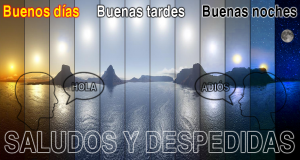Language/Spanish/Vocabulary/Saludos
< Language | Spanish | Vocabulary
Jump to navigation
Jump to search
Rate this lesson:
Here are some greetings and farewells in Spanish. Good learning! Feel free to edit this wiki page if needed.
- Adiós = Goodbye - The most common farewell for any time.
- Buenos días = Good morning - You can say “buenos días” from dawn to noon.
- Buenas tardes = Good afternoon - You can say “buenas tardes” from noon to dusk or 8:00 PM.
- Buenas noches (Is it a greeting? Yes, it is.) = Good evening – You can say “buenas noches” overnight.
- Buenas noches (Is it a farewell? Yes, it is.) = Good night - You can say "buenas noches" when you say goodbye at night. Usually when you go to sleep.
- Buenas = This is a generic and colloquial greeting. Serves for any time.
- Chao/chau = A informal farewell. "Bye bye"
- ¿Cómo está usted? ( formal )¿Cómo estás? ( informal ) ¿Qué tal? ( informal ) = How are you? / How do you do? - The most used answer is: “Bien, gracias” = Fine, thank you.
- Cuídese ( formal ) Cuídate ( informal ) = Take care - It's an affectionate farewell. You wish the other person to continue well. The plural is: “cuidense” ( formal ) or “cuidaros” ( informal ).
- Hasta ahora = See you in a minute - You can say “Hasta ahora” If you don't delay in seeing the person/people again.
- Hasta luego = See you later - You can say “Hasta luego” when you know or believe that later you'll see the person/people.
- Hasta mañana = See you tomorrow – You can say “Hasta mañana” when you know that you'll see the person/people the next day.
- Hasta el + ( día de la semana ) = See you on + ( day of the week ). Example: Hasta el lunes / See you on Monday.
- Hasta pronto = See you soon - It is a farewell with the desire for a new reunion, but you don't know when it will happen.
- Hasta nunca = See you never – You can say “hasta nunca” when you don't want to see that person/people again.
- ¡Hola! = Hi! / Hello! - The most common greeting for any time.
- Nos vemos = So long - It does not specify the moment that you will meet the person/people again.
- ¿Qué hay? ( informal ) = what's new? - It is an abbreviation of "¿Qué hay de nuevo?" If you don't want to enter into a conversation, the most explicit answer is: "No mucho" = Not much!
- ¿Qué pasa?/¿Que onda? ( informal ) = What's up?/ What's happening?/ What's going on? If you don't want to enter into a conversation, the most explicit answer is: "Nada" = Nothing!
I hope it can help you.
Other Lessons[edit | edit source]
- Ecuadorian Slang
- Conversation connectors
- Animals
- Bathroom
- Conversación básica en un restaurante
- Lunfardo
- Foreign loanwords
- Art
- Airport

